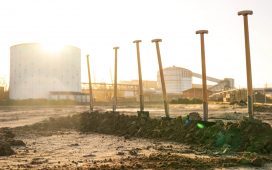Satellite image of Hurricane Francine on Sept. 11, 2024.
NOAA GOES EAST
U.S. crude oil jumped more than 2% to trade above $69 per barrel on Thursday after Hurricane Francine churned through the Gulf of Mexico, disrupting oil production before making landfall in Louisiana.
Oil futures rose more than 2% in the previous session as the storm threatened supplies. As of 1 p.m. Central time Wednesday, nearly 675,000 barrels per day of oil were shut in the Gulf, according to Andy Lipow, president of Lipow Oil Associates.
The figure will likely to rise to over one million barrels per day on Thursday, Lipow said.
“Hurricane Francine has likely disrupted about 1.5mn barrels of US oil production, which we estimate will reduce September production in the Gulf of Mexico by around 50,000bpd,” Giovanni Staunovo, an analyst at UBS, told clients in a Thursday note.
Here are Thursday’s energy prices:
- West Texas Intermediate October: $69.06 per barrel, up $1.75, or 2.6%. Year to date, U.S. crude oil has fallen more than 3%.
- Brent November contract: $72.17 per barrel, up $1.56, or 2.2%. Year to date, the global benchmark has dropped around 6%.
- RBOB Gasoline October contract: $1.9249 per gallon, up about 1.5%. Year to date, gasoline has pulled back about 8.5%.
- Natural Gas October contract: $2.33 per thousand cubic feet, up 2.6%. Year to date, gas is down more than 7%.
The quick rebound on the storm came after prices closed at their lowest level since December 2021 on Tuesday. Staunovo said the recent slump may be due to traders losing confidence in OPEC’s ability to maintain compliance with production cuts at lower price levels.
UBS expects oil prices to continue to rise, at least in the short term.
“With likely further oil inventory declines ahead as supply lags demand growth, and given low speculative positioning, we retain our positive price outlook—we expect Brent crude oil to move back up above USD 80/bbl over the coming months,” Staunovo said.







